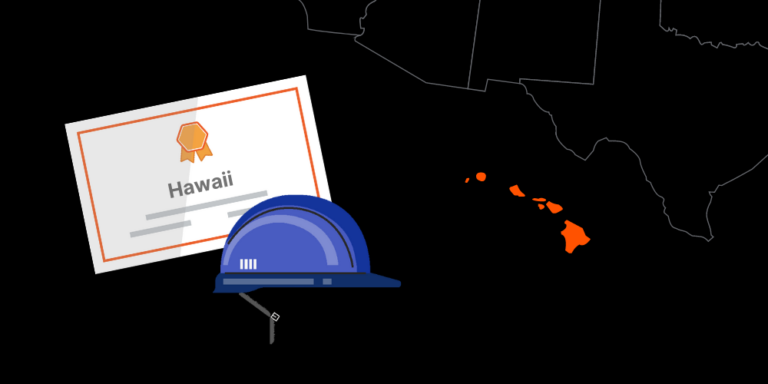

Starting a new construction business in Hawaii almost definitely means getting a Hawaii contractor license. Hawaii's Contractor License Board (CLB) manages the contractor licensing process, which is a required step for anyone dealing with construction contracts greater than $1,000.
Fortunately, the licensing process is fairly straightforward, and this blog contains the information you can use to help become fully licensed in Hawaii.
Table of contents
The State of Hawaii requires anyone "who offers to, holds oneself out to, or contracts to perform residential, commercial, or public works construction, alterations, or improvements" to hold a contractor license.
Hawaii simplifies licensing by requiring all contractors to go through the same entity. Licenses for construction contractors go through the Hawaii Department of Commerce and Consumer Affairs’ Contractor License Board. The board offers three license types: General Engineering Contractor, General Building Contractor, and Specialty Contractor, which includes plumbers, electricians, roofers, glaziers, and more.
Here are the steps to get a contractor's license in Hawaii.
The requirements and process for applying for each of these licenses are the same. The requirements for licensing are:
You must be 18 years of age or olderYou must have a good reputation in all aspects, including honesty, financial integrity, and fair dealing
You must prove you have four years of supervisory experience in the trade within the past 10 years You’ll have to pass an examination for the appropriate license classification You also need to secure liability and workers’ compensation insuranceTo apply for a license in Hawaii, prospective contractors will use this application. The same rules and regulations apply to electrical and plumbing contractors, with the additional requirement that they must hold a trade license at the journey or master level.
Beyond typical requirements — such as Social Security numbers and proof of experience — there are a few other items you’ll need to provide with the application.
At least three notarized certificates in support of your supervisory experience (if you’re applying for more than one classification, submit at least one certificate for each classification)
A chronological list of projects to prove your four years of supervisory experience A recent (within the last six months) credit report issued by a credit reporting agencyThe name and information of your RME (Registered Managing Employee) if you’re applying as a corporation
A copy of the Contractors Laws and Rules by submitting a written request to the Contractor Licensing Board
Free educational courses on Health & Safety, Data in Construction, and more. Earn Your Continuing Education Units (CEUs) for license renewals and career advancement with Procore.
![]()
The fees involved in acquiring a license are as follows:
$50 for application (which must accompany the application) $75 for examination per part (there are two parts, and Prometric collects these payments)All licensing windows run from October 1 through September 30 of the following year, and fees are dependent on the year in which the window closes:
| License Type | Window Closing Odd Year | Window Closing Even Year |
| Corporations Requiring RME | $438 | $334 |
| All other Licenses | $663 | $494 |
Contractors will also have to renew their licenses every two years. Licenses expire on September 30 of even-numbered years. The state will mail renewal applications to all current license holders by August 15 of that year.
The fees for renewal are $353 for a contracting entity or sole proprietor and $208 for Responsible Managing Employees.
Once the application is complete, you can mail it to:
Contractors License Board
DCCA, PVL Licensing Branch
P.O. Box 3469
Honolulu, HI 96801
Or hand-deliver it to:
335 Merchant St., Room 301
Honolulu, HI 96813
Phone: 808-586-3000
You have six months from the time you mail in your application to take the examination. The exam is a two-part test held by a professional testing service called Prometric.
The sections include Business and Law (which every contractor must take) and a trade-specific section. That copy of the Contractors Laws and Rules you had to request by mail should be a sufficient study guide for the Business and Law section.
As part of your application, you'll need to provide proof of the following:
Workers compensation insurance, which is required for any contracting business that has employees.Liability and property damage insurance, which will be demonstrated with a certificate from an insurance company, with minimum liability coverage of $100,000/$300,000 for bodily injury and $50,000 for property damage.
A valid business address, which is where you will be served notices related to your license. A PO Box cannot be used for this purpose.
With all of these requirements met, you'll be able to submit your application, fees, and relevant documentation to the Hawaii CLB in order to acquire your contractor's license.
Hawaii sees unlicensed contracting as a misdemeanor, which means it’s a criminal offense. While the fines, fees, and sentences vary by location and situation, understand that contracting without a license is an arrestable offense. It could result in fines or jail time.